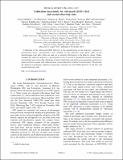Calibration uncertainty for Advanced LIGO’s first and second observing runs
Author(s)
Cahillane, Craig; Betzwieser, Joe; Brown, Duncan A.; Goetz, Evan; Hall, Evan D.; Izumi, Kiwamu; Kandhasamy, Shivaraj; Karki, Sudarshan; Kissel, Jeff S.; Mendell, Greg; Savage, Richard L.; Tuyenbayev, Darkhan; Urban, Alex; Viets, Aaron; Wade, Madeline; Weinstein, Alan J.; ... Show more Show less
DownloadPhysRevD.96.102001.pdf (1.855Mb)
PUBLISHER_POLICY
Publisher Policy
Article is made available in accordance with the publisher's policy and may be subject to US copyright law. Please refer to the publisher's site for terms of use.
Terms of use
Metadata
Show full item recordAbstract
Calibration of the Advanced LIGO detectors is the quantification of the detectors’ response to gravitational waves. Gravitational waves incident on the detectors cause phase shifts in the interferometer laser light which are read out as intensity fluctuations at the detector output. Understanding this detector response to gravitational waves is crucial to producing accurate and precise gravitational wave strain data. Estimates of binary black hole and neutron star parameters and tests of general relativity require well-calibrated data, as miscalibrations will lead to biased results. We describe the method of producing calibration uncertainty estimates for both LIGO detectors in the first and second observing runs.
Date issued
2017-11Department
LIGO (Observatory : Massachusetts Institute of Technology)Journal
Physical Review D
Publisher
American Physical Society
Citation
Cahillane, Craig et al. "Calibration uncertainty for Advanced LIGO’s first and second observing runs." Physical Review D 96, 10 (November 2017): 102001 © 2017 American Physical Society
Version: Final published version
ISSN
2470-0010
2470-0029